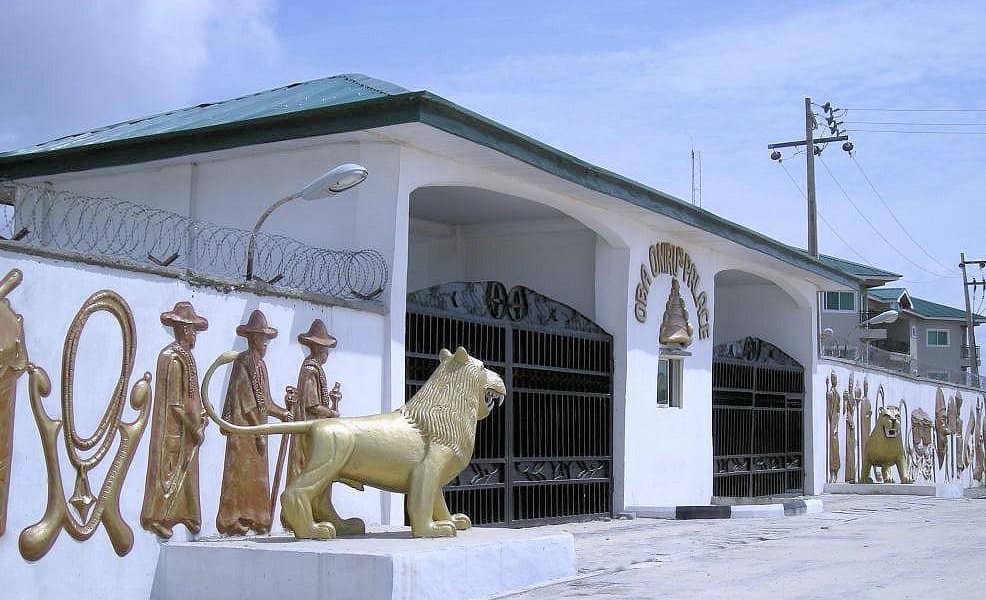Introduction
Lagos Island, one of Nigeria’s most dynamic and historic hubs, is steeped in rich heritage dating back to the 15th century. This iconic area was first inhabited by Chief Aromire, a nobleman from Ile-Ife, who transformed the land into a thriving fishing post and pepper farm. Over time, the island evolved from a simple settlement into a bustling center of commerce, governance, and culture. At the heart of this transformation stands the majestic Iga Idunganran Palace, a symbol of Lagos’ deep-rooted legacy and resilience. Join us as we take a journey through the history of this extraordinary landmark.

The Origin of Lagos Island and Chief Aromire’s Legacy
In the 15th century, Lagos Island was a quiet, uninhabited expanse until Chief Aromire, a nobleman from Ile-Ife, claimed the land as his own. Aromire saw the island’s potential and utilized it as a fishing post, capitalizing on the abundant waters that surrounded it. Additionally, he established pepper farms, which were a valuable commodity at the time, contributing to the growth of trade in the region. This humble beginning laid the groundwork for Lagos Island to become a vital part of the growing Yoruba Kingdom and, eventually, the bustling metropolis we know today.
Iga Idunganran Palace: A Royal Residence Through the Ages
The Iga Idunganran Palace, the seat of Lagos royalty, holds an esteemed place in Nigerian history. The original palace was built in 1670 for Oba Gabaro, who ruled from 1669 to 1760. Crafted with the architectural flair and cultural elements of its time, the palace was later modernized by Portuguese traders who brought tiles and other materials from Portugal, introducing a blend of European influence into the structure. The palace’s architecture is a fascinating fusion of indigenous and European styles, reflecting the international connections that Lagos fostered even in the early days.
The Modernization of Iga Idunganran
Iga Idunganran continued to evolve as the city grew, undergoing significant renovations in modern times. The palace was extensively modernized under the reigns of Obas Adeniji Adele II and Adeyinka Oyekan II, and further refurbishment took place in 2007 and 2008 under the present Oba, Akiolu. These updates, conducted in collaboration with the Lagos State government and the Nigerian Museum, were part of a broader effort to preserve and honor Nigeria’s royal heritage while adapting the structure to contemporary needs. Today, the palace stands as a testament to Lagos’ rich past and its forward-looking future.
A Center for Administration, Commerce, and Culture
Beyond serving as a royal residence, Iga Idunganran has historically functioned as an administrative center, market hub, and the venue for the Eyo Festival. The Eyo Festival, unique to Lagos, is a vibrant cultural event that brings together residents and visitors to celebrate the city’s Yoruba roots through music, dance, and colorful masquerades. The palace is central to this festival, symbolizing the spirit of unity and tradition that continues to bind the people of Lagos.
Conclusion
From its inception as a simple fishing post to its current status as a historic and cultural landmark, Iga Idunganran Palace remains a cornerstone of Lagos Island’s identity. This palace not only houses the royal lineage but also represents the enduring legacy and resilience of Lagos. Each renovation, from the Portuguese influence to the recent modernizations, has added layers to the palace’s story, making it a living testament to Nigeria’s diverse cultural heritage. For those interested in history, architecture, or Yoruba culture, Iga Idunganran is a must-visit—a place where the past and present coexist, and where the heartbeat of Lagos can still be felt.
Whether as a symbol of authority, a marketplace, or a ceremonial ground, Iga Idunganran continues to shape the legacy of Lagos Island. This palace reminds us of the importance of preserving our heritage and cherishing the stories that connect us to our ancestors.




Leave a Reply